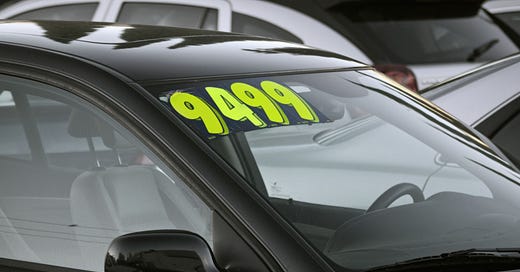Tom Talks Taxes - September 16, 2022
All about the new §25E previously-owned clean vehicle credit
Last week, I reviewed the revised §30D clean vehicle credit; this week, I’m doing an overview of the brand new §25E credit for previously-owned clean vehicles.
The §25E credit is available for previously-owned clean vehicles placed into service after December 31, 2022, and before January 1, 2033. It is a nonrefundable personal credit.
A qualified buyer who places into service a previously-owned clean vehicle receives a nonrefundable credit equal to the lesser of $4,000 or 30% of the vehicle sale price.
A qualified buyer is an individual who:
Purchases the vehicle for use and not resale,
Cannot be claimed as a §151 dependent by another taxpayer, and
Has not claimed a §25E credit for a vehicle sale during the three years ending on the date of the current vehicle sale.
A previously-owned clean vehicle is a motor vehicle:
Whose model year is at least two years earlier than the calendar year of purchase (i.e., in 2023, the model year must be 2021 or earlier),
Whose original use commences with a person other than the taxpayer,
Acquired by the taxpayer in a qualified sale, and
That is one of two types of vehicles.
A qualified sale is the sale of a motor vehicle:
By a §30D(g)(8) dealer,
For a sale price of $25,000 or less, and
Which is the first transfer to a qualified buyer (other than the original use taxpayer) since August 16, 2022.
The two types of vehicles eligible for the §25E credit are:
A fuel cell vehicle that meets §30B(b)(3)(A), (B) requirements, or
A motor vehicle that meets the general §30D electric motor vehicle requirements except that final assembly does not have to occur in North America, and there are no critical mineral or battery component requirements.
The following rules apply to the §25E credit:
The credit amount reduces the vehicle basis.
Any other deduction or credit allowed for a vehicle is reduced by the §25E credit amount.
A vehicle used predominantly outside the United States is ineligible.
The IRS can recapture the credit for a vehicle that ceases to be eligible.
A taxpayer can elect not to claim the §25E credit.
The vehicle must meet certain air quality and safety standards.
In addition, only one §25E credit is allowed per vehicle, based on the vehicle identification number (VIN), and the VIN must be provided on the taxpayer’s return.
A modified adjusted gross income (MAGI) limit applies to the §25E credit. If a taxpayer’s MAGI (adding back §911, §931, and §933) exceeds the following amounts, no credit is allowed:
$150,000 for a joint return or a surviving spouse,
$112,500 for a head of household, or
$75,000 for all other filing statuses.
To apply the MAGI limit, the taxpayer uses the lesser of MAGI in the current tax year or MAGI in the immediately preceding tax year. This provision stops unanticipated increased income in the year of purchase from preventing §25E credit eligibility.
For vehicles placed in service after December 31, 2023, taxpayers can elect to transfer their credit to treat it as a payment to the dealer. This election must be made no later than the vehicle's purchase date. If a taxpayer who makes this election ultimately does not qualify for the §25E credit, their total tax is increased by the payment amount. This provision allows a taxpayer to get the full credit value in the year of purchase, even if their total tax is less than the credit amount.
Here are planning considerations for the §25E credit:
This credit has far fewer restrictions than the §30D credit; however, the $25,000 purchase price limit may disqualify many used vehicles for the credit.
Private-party sales do not qualify for the §25E credit. All qualified sales must be from a car dealer.
Married filing separately will likely be a credit strategy for a married couple consistently over the MAGI limit; however, how this applies to jointly owned vehicles is unknown.
A §151 dependent cannot claim the §25E credit; however, their parent can claim the credit if the parent purchases the car for the dependent’s use.
The MAGI income limits are much lower for this credit; higher-income individuals must buy a new vehicle to get a tax credit.
A business vehicle does not qualify for the §25E credit, and a business cannot claim the §45W commercial clean vehicle credit for a used car. A business generally must buy a new vehicle to get a tax credit.
Share Your Thoughts
If you are a paid subscriber, use the comments section below to discuss or ask questions about the new §25E previously-owned clean vehicle credit.
Upcoming In-Person Events
Learn more about my scheduled in-person education events for 2022 and 2023 on my website. I hope to see you at an in-person event in the next year.




